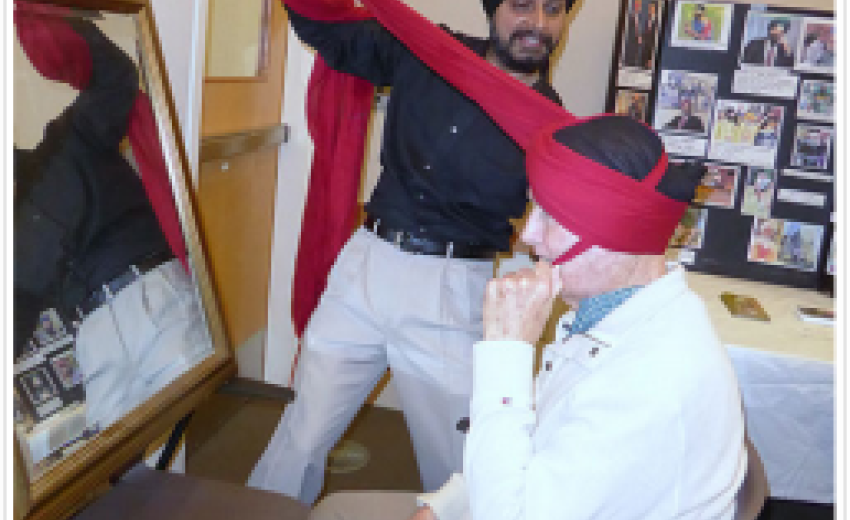Throughout November for Sikh Awareness and Appreciation Month in Santa Clara, the nonprofit Joy of Sewa has planned informative and engaging activities focusing on Sikhs and Sikhism, a religion which originated in the Punjab region of India in the 15th century.
"Becoming American, the Story of the Sikh Pioneers of California Migration over 125 Years," was a presentation, followed by a brief panel discussion, by Dr. Jasbir Singh Kang Nov. 19 at Central Park Library. Kang is the founder of the Punjabi Heritage Society and Pujab Digital Archive at University of California Davis.
Fundamental to Sikhism, one of the youngest and fifth largest of the world religions, are the belief in one creator, selfless service, social justice and the unity and equality of all people.
"American and Sikh values are similar and based on equality, justice and hard work. Our values make us American, not our external appearance," said Kang. "Diversity is the biggest strength of America."
The panelists were sociologist Jennifer Myhre and anthropologist Ameeta Tiwana, both at De Anza College, and anthropologist Sangeeta Luthra at Santa Clara University. They spoke about the value of diversity and the challenge of building understanding between immigrants and others.
"Immigrants bring new ideas to solve old problems. They bring new eyes," said Luthra. In the Bay Area, for example, Dr. Narinder Singh Kapany is the Father of Fiber Optics.
An informal reception opened the program. About 50 attendees, most of them Sikh, mingled over refreshments such as spicy Indian pakoras. Non-Sikh guests were given the opportunity to wear a turban, skillfully wrapped by an experienced Sikh in a choice of styles from traditional to modern.
The turban, worn over uncut hair tied in a bun, is revered as part of the Sikh identity. The soft, cotton cloth averages four and a half to ten feet in length. It can be as conservative as black or as bold as red or purple to match a man's tie. One man said that he has about 20 turbans.
It is not common for a woman to wear a turban. However, she can be identified as Sikh by the stainless steel or iron bracelet (kara) that she wears. A kara is also worn by men.
Standing out as they do, Sikhs continue after more than a century in America to experience discrimination, sometimes mistakenly being associated with terrorists. September 25 in Richmond in an unprovoked attack, several men beat a Sikh man in his car, pulling off his turban and cutting off some of his hair.
"This is a challenge every father faces," said Kang, quoting statistics that 70 percent (some say higher) of Bay Area Sikh children are bullied.
According to the Sikh Coalition, with offices in Fremont (www.sikhcoalition.org), more than 500,000 Sikhs live in the U.S. Yuba City, where Kang lives, has the largest Sikh population in the U.S. and outside of India. The city hosts an annual Sikh parade that draws many thousands of people the first weekend of November.
"Becoming American," which opened in March 2012, is a permanent multi-media exhibit at Community Memorial Museum of Sutter County in Yuba City (Punjabipioneers.com).
"We can't live in America and have our heart in another country," said Kang in concluding his presentation.
The event, supported by the Santa Clara Cultural Commission, was organized by the Joy of Sewa (www.fb.com/joyofsewa) and San Jose Sikh Gurdwara (temple)–the largest in North America (www.sanjosegurdwara.org).
"The Santa Clara library continues to support programming that increases awareness and understanding between the diverse cultures of our community," said Santa Clara Cultural Commissioner Harbir Bhatia, crediting the library's support of year-round cultural events such as Sikh Awareness and Appreciation Month.
Sikh Awareness Month events culminate December 3, 1 p.m. to 4 p.m., in a family celebration at Don Callejon School, 4176 Lick Mill Blvd., Santa Clara. The afternoon includes kids' activities, short films, cultural performances, a turban fashion show, lunch, and a bone marrow and blood drive. Visit www.saam-ca.org for additional information.
Story and photos by Diane Andrews
